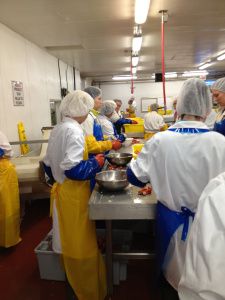Third in a series about living in rural poverty in the Annapolis Valley riding of Premier Stephen McNeil.
Mariana is dressed up for her coffee date. She is dressed very nicely, in slacks, a blouse, and with a jacket over her arm. She looks around the very hip coffee shop.
“I’ve never been in here before” she says.
No wonder, with a coffee costing approximately $4, Mariana could never afford to hang out at this coffee shop
Normally Mariana is dressed in rubber boots, old jeans and a sweatshirt. Often you can also tell when she is in a room because she will be smelling of fish. Mariana works at a fish plant doing piece work. At $1.85 a lb for shucking clams Mariana doesn’t make much.
“If the clams are small” she says, “it takes longer to shuck a pound. On a good week, I will make $200.” Her wrists, however, will hurt from the cold, repetitious work and her back will ache from standing on a concrete floor for many hours.
Mariana has tried several times to find better paying work. She has taken out student loans and completed year long courses in Business Administration and a course in para-legal law research. Having the education is one thing; but getting a job in rural Nova Scotia is something else. .
“If was a Catch 22 situation” she explains. “If you don’t have the experience, you can’t get the job. And if you can’t get a job, you don’t get the experience.”
So she ended up back at the fish plant each time. And the fish plant piece work does not pay enough for Mariana to support herself and her three children.
Mariana has 5 children, two of whom have completed high school. One has gone on to post secondary schooling and one has gone out west to work in booming Alberta. Mariana still has two teenagers and a nine year old left at home.
When Mariana’s marriage broke up a year ago, she took her three children and moved into an apartment in the local town. The rent for the apartment was $695 a month. And the heat was electric. Which meant that they were always cold and Mariana couldn’t afford the monthly heat bill.
“I immediately had problems with the children trying to adjust to our lives, not only without their father, but also without any money” she says. “I had to constantly say No to them and they resented it. We didn’t have a lot of money when we lived with their father, but after the marriage ended and we moved out, we had a lot less money.”
Mariana continued to work at the fish plant but, with no vehicle to get her from the town to the fish plant, meant she had to pay a co-worker each day for a drive to work. She applied for help from Income Assistance and they have helped her out with the transportation. But even with that help, the children’s Child Tax Credit and her pay from employment, it wasn’t enough to keep her children fed healthy foods, housed, clothed, in school with everything they needed.
“Students these days need computers, printers, the internet. And then there is the food. Do you know how much food teenagers eat?” Mariana laughs.
Mariana considered going on to social assistance full time. She did not want that to happen.
“I have been on social assistance before” she says. “It’s degrading and humiliating. It’s like they do everything they can to make your life difficult when you are on social assistance.”
So she thought long and hard about the situation and then made some heartwrenching decisions.
With their future looking grim on its’ current course, Mariana decided to take her children off that path and put them on to another, with a brighter outlook.
Mariana decided to give up her children.
One child went out west to live with his sister who has a good job in Alberta; one child (who is going to graduate from high school soon), went to live with Mariana’s aunt and uncle. The youngest child went to live with her father and continues on in the school she has been attending.
Mariana now boards in a private home and pays much less in rent. She still works at the fish plant.
Mariana also decided that she would go back to school - for the third time. She likes dealing with people and she likes helping people. She will take a course as a Continuing Care Assistant (CCA) as that is the only growing field of employment in this area.
The thing that worries Mariana the most is a vehicle. She will need a vehicle for her new career.
Mariana has been saving for a car but it’s hard
“I get a few dollars put away but then the kids need something. They need new clothes, a computer repair, graduating fees...it’s always something. “
Despite this, Mariana is excited to be going back to school. When she finishes the course and if she gets a job, she will be able to better support her children and maybe to save some money for her old age.
“People tell me that I am a bad mother for letting my children go. It wasn’t an easy decision and my heart is broken from having to do that.
If our province has affordable housing and didn’t make it so hard to get help, I would not have done what I did” she says. “But my children understand. And that is what is important. We will be back together again someday. I hope.”
See also:
Elizabeth's story. Struggling (and failing) to make ends meet in rural Nova Scotia
Kirk's Story. Surviving in rural Nova Scotia on $525 a month
Check out the blog Rural poverty in Annapolis West.



